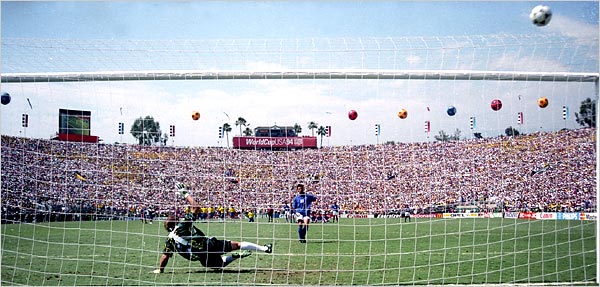
Here's the deal with penalties: while there's a lot of literature and science out there (none of which I've read) on how to take them, how to save them, and how to increase the percentages in both directions, it's essentially a simple task. The goalkeeper has to guess which direction the ball will travel before it's kicked, and if he guesses right, there's a chance he might save it. Now, this guess might be informed by clues as to how the placekicker is standing, how he approaches, etc. But the kickers know about all these clues, and most of them approach from a straight path in order to disguise their intentions.
In other words, it's an endeavor of luck, and a really shitty way to end a soccer match. Most of the kicks go for goals, obviously. When they don't, it's either a case of the goalie getting lucky, or the kicker screwing up. In both situations, an otherwise talented soccer player has to face the brunt of criticism from media and fans for failing at a specialized task that has little to no bearing on his ability to play the actual game.
Today was no exception. The Japanese goalie guessed right on the first two Paraguay kicks, but just missed both of them. The Paraguayan keeper guessed right once in four kicks, but the third attempt, taken by Yuichi Komano, smashed the woodwork and bounced harmlessly away. That was the difference in the match, and now Japan has to go home.
But imagine being Komano. Yuck. Psychological stress, shame, disappointment you can probably never atone for, and the miserable situation of taking the entire blame on your shoulders. He's made himself into a target. Granted, this kind of thing will happen in sports. We all know the names of Bill Buckner and Scott Norwood. But when it doesn't have to happen? Get rid of it.
The best solution I've heard is to end the game after 120 minutes, and if it's still tied, have three impartial judges score the match like a boxing bout. The team who exhibited better style goes through. Easy and fair. It would also cut down on crappy teams just being defensive and scared. You want to play for a tie against a better team? Fine, go home. Otherwise, try like hell to score near the end. Boring play will get you 120 minutes of grueling effort for a TKO loss. And this system maintains the integrity of the game without letting it devolve into a novelty act based on fickle fortune. Would you decide a football game with a field goal contest? A baseball game with a home run derby? Basketball with a slam dunk or three-point shooting contest?
Of course not. But this is soccer, so the most backward method is de rigueur.
Anyway, sucks for Japan. In better news, the Yanks and Mariners face off tonight in what should be an excellent game. Phil Hughes is on the mound, and it's a well-kept secret that his last few starts have not been quite as impressive as his opening salvo. The wins keep piling up, but the stuff had diminished as the ERA rises. He's also coming off a lengthy rest due to Joe Girardi's idea that young pitchers shouldn't throw too many innings without first building up their arm strength.
Fortunately, he'll be facing a withered Seattle lineup. Unfortunately, he'll be matched against Cliff Lee, who can make any lineup look withered. I expect a low scoring affair (duh), and a 3-1 Yankee win as Hughes gets his mojo back. I'll probably at the stadium tomorrow, for Javy against Felix, a match-up that looks much better now than it would have a month ago.
Spain and Portugal are tied at halftime in the Battle for Iberia. Loser has to speak with a lisp.
Speaking of that, and before I leave, I've always heard that the reason half of Spain speaks with a lisp is that a conquering foreign king once had a lisp, and his subjects had to follow suit so they wouldn't offend him. Once the people in power were doing it, everyone else got on board, and then their children did it, and etc. until it became a cultural institution. Is that even close to being true? It sounds kinda like something people who hate Spain might make up. But if it's legit, whoa, right!?
Adioth.

No comments:
Post a Comment